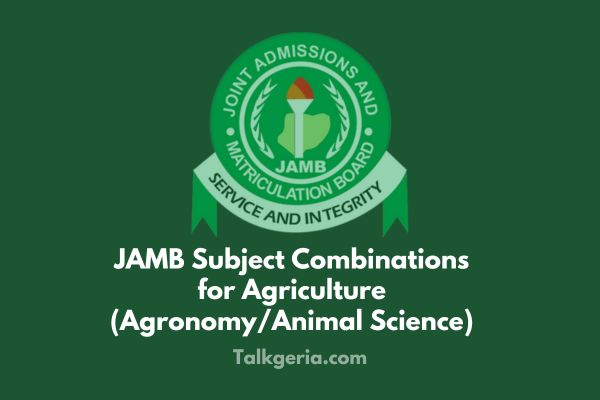Agriculture is a vital field that encompasses the study of farming, crop production, animal husbandry, and agricultural technology. Whether you’re interested in agronomy, animal science, or any other area of agriculture, understanding the right JAMB subject combination is essential for pursuing a degree in this field.
JAMB subject combination for Agriculture
For candidates aspiring to study Agriculture, including specializations like Agronomy or Animal Science, the typical JAMB subject combination includes:
- Use of English: As with all courses, Use of English is compulsory for all JAMB candidates.
- Biology: Biology is crucial for understanding the biological processes related to plant and animal life. It is foundational to all areas of agriculture, including crop production, animal breeding, and the management of agricultural ecosystems.
- Chemistry: Chemistry is important for understanding the chemical processes involved in soil management, fertilization, and plant growth. It is also essential for those interested in agricultural engineering and biotechnology.
- Agricultural Science: Agricultural Science covers the practical and theoretical aspects of farming, crop management, livestock production, and the use of technology in agriculture. This subject provides the specific knowledge needed for various agricultural careers, including those in animal husbandry, crop production, and agricultural research.
These four subjects are typically required for most universities offering Agriculture.
Why These Subjects Are Important
Each of the required subjects plays a significant role in preparing students for a successful career in agriculture:
- Use of English: Strong communication skills are vital for writing reports, research papers, and policy documents in the agricultural field. Effective communication is also essential for working with farmers, agricultural organizations, and the broader community.
- Biology: Biology provides an understanding of the living organisms involved in agriculture, from plants to animals. Knowledge of biological processes such as reproduction, growth, and disease management is essential for anyone working in the agricultural sector.
- Chemistry: Chemistry is essential for understanding how fertilizers, pesticides, and other chemicals affect plant and soil health. It also plays a significant role in studying food production, preservation, and agricultural engineering.
- Agricultural Science: Agricultural Science provides the practical knowledge and skills needed to apply scientific concepts to real-world farming practices. It covers various topics, including soil science, crop management, livestock breeding, and sustainable farming techniques.
Frequently Asked Questions
1. Can I study Agriculture without Agricultural Science?
While Agricultural Science is highly recommended, some universities may accept alternative subjects such as Geography. However, Agricultural Science offers specialized knowledge that is directly applicable to many fields within agriculture, such as crop production, livestock management, and agricultural research.
2. Is Chemistry compulsory for Agriculture?
Yes, Chemistry is an essential subject for Agriculture. It is necessary for understanding soil composition, fertilizers, pesticides, and other agricultural chemicals. It also plays a key role in areas like food production and agricultural engineering.
3. Can I substitute Animal Science with another subject in the JAMB combination?
While Animal Science is a core area of agriculture, it is typically covered under the Agricultural Science subject in JAMB. You would focus more on animal-related topics during your university studies. If Animal Science is your specific area of interest, it will be explored in-depth during your degree program.
4. What career opportunities are available after studying Agriculture?
Graduates of Agriculture have diverse career opportunities in both the private and public sectors. Possible careers include roles as agricultural consultants, farm managers, agronomists, animal scientists, agricultural researchers, and extension officers. Agriculture graduates can also work in agricultural policy, food production, sustainability projects, and agricultural technology.
Conclusion
Selecting the right JAMB subject combination is essential for a successful career in Agriculture. The combination of Use of English, Biology, Chemistry, and Agricultural Science provides a comprehensive foundation for studying various aspects of agriculture, from crop production to animal husbandry and agricultural research. Always check with your desired university for specific subject requirements, as they may differ. With the right combination and focus on these subjects, you will be well-equipped to pursue a rewarding career in agriculture.

